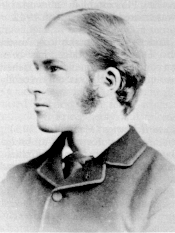| Profile | Major Works | Resources |
John Neville Keynes, 1852-1949.

Cambridge logician and economist, best known as the father of John Maynard Keynes.
John Neville Keynes was the delicate only son in a wealthy Salisbury manufacturing family. His father, John Keynes, had inherited a brush-making business, which he soon abandoned to his brother, concentrating on horticulture instead. A non-conformist (Congregationalist) family, Neville Keynes' education was pursued at local schools and Amersham Hall, a dissenting academy. Despite a nervous constitution and anxious disposition, which apparently marred his performance in examinations and much of his career, Keynes managed to win the Gilchrist Scholarship in 1869 at University College London and, a few years later, a mathematical scholarship to Pembroke College, Cambridge. But he didn't stay with mathematics, and switched to the Moral Science Tripos soon after, showing a particularly affinity for logic. It was around this time that he came under the influence of Alfred Marshall.
Uncertain about his career prospects, Neville Keynes insured himself by completing degrees at both UCL and Cambridge, and, in 1876, was simultaneously elected a Fellow of both Pembroke College and UCL. Tutoring Cambridge students in both logic and political economy, his old teacher, Alfred Marshall, tried to steer him in the direction of economics and encouraged him to compete for the Cobden prize. But having failed that, and with Marshall gone in 1877, Keynes concentrated on tutoring in logic, leaving political economy to Herbert Foxwell.
In 1880, Keynes got engaged to a Newnham college student, Florence Ada Brown, endangering his Pembroke fellowship (Cambridge fellowships were then reserved for bachelors). One possibility urged upon him was to apply for Jevons's vacant chair at UCL in 1880, but the anxious Keynes declined, preferring to stay in Cambridge rather than move to London. So, in 1882, Keynes took up an administrative job with Cambridge's Local Examinations Syndicate (a job he would hold until 1910) and married Florence. His first son, John Maynard, was born a year later.
In 1884, Keynes published his Studies and Exercises in Formal Logic, based on his lessons. Its pedagogic clarity was a hit with students and went through several editions. That same year, he was appointed Cambridge University Lecturer in Moral Sciences (a post he held until 1911).
At the end of 1884, Alfred Marshall, then at Oxford teaching economics to Indian civil service students, was appointed as professor of Political Economy at Cambridge and persuaded Neville Keynes to fill in for his teaching duties at Oxford. Marshall also attempted, more strenuously (and with the connivance of Florence), to get Neville Keynes to secure a permanent appointment at Oxford. Keynes agreed to teach for one day at week at Oxford, but refused anything more permanent, and declined to submit his candidacy for the Oxford Drummond chair in 1888.
Nonetheless, his Oxford experience led to John Neville Keynes's re-encounter with economics, and in 1891, he produced his most famous tract, The Scope and Method of Political Economy (1891). It was a masterpiece of compromise: Keynes attempted to reconcile the historical and theoretical approaches, the Classical and Neoclassical schools. In this manner, Keynes set out the methodological approach of the Marshallian school.
Keynes wrote the entry on W. Stanley Jevons in Encyclopaedia Brittanica.
|
Major Works of John Neville Keynes
|
|
HET
|
|
Resources on Neville Keynes
|
All rights reserved, Gonšalo L. Fonseca
